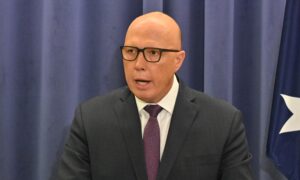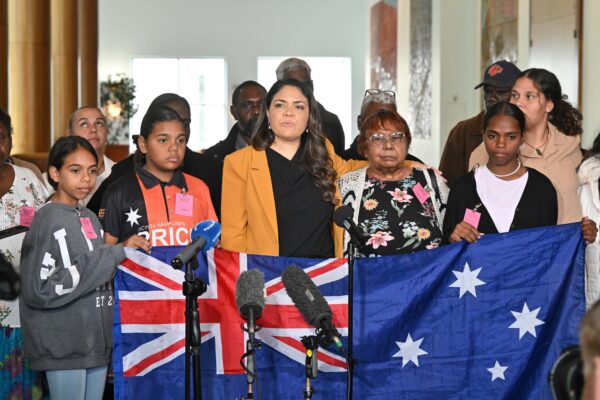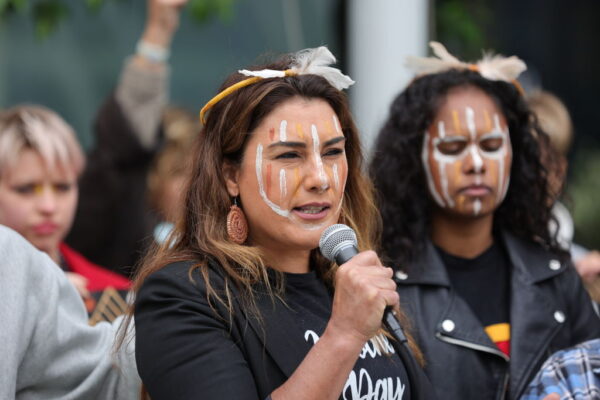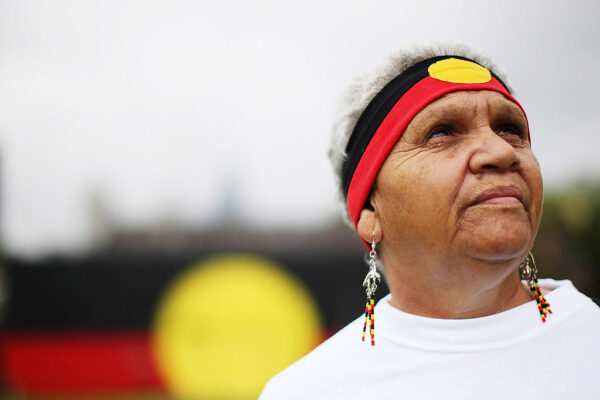Liberals Take Principled Stance on the Voice, Will Australia Be Open to Listening?
Commentary Leadership requires the strength to say “NO” even when those around you clamour to proceed and can’t foresee the inherent danger. With opinion polling suggesting that Australians are positively disposed to supporting “The Voice” proposal to alter their Constitution, the Liberal/National Coalition has taken a strong, principled stand in opposing the proposal both on principle and in detail. The temptation to go with the “zeitgeist,” the media mayhem, and the endless virtue signallers to avoid the foreseeable criticism was a test of fortitude and resolve so absent from Australia’s centre-right Coalition for the past half dozen years. The strong sense is they’ve finally taken a stand on something based on principle, not tactics alone. But such a stand comes with risks—high risks. A “YES” victory will come with the allegation that the Coalition is on the wrong side of history and mean-spirited. With a “NO” victory, the Coalition will be accused of being wreckers. This would have weighed heavily on the Coalition’s collective minds, making the stance taken genuinely honourable. Overwhelmingly, there is a commitment by all Australians to the well-being of their Aboriginal brothers and sisters. Country Liberal Party senator Jacinta Nampijinpa Price and 22 Indigenous community leaders at a press conference at Parliament House in Canberra, Australia, on March 22, 2023. (AAP Image/Mick Tsikas) The welfare of the Australian Aborigines has been an issue with which policymakers since European settlement have grappled with the best intentions in the world but with few beneficial outcomes. There have been legislative and judicial interventions a plenty which, while hailed at the time, have had no real on-ground benefits to enhance the welfare of Australia’s Aborigines. Well-Intentioned Discrimination The latest well-meaning but misguided suggestion is the proposed change to the Australian Constitution dubbed “The Voice.” The Voice seeks to constitutionally lock in an extra voice to the parliamentary system apart from the two Houses of Parliament whereby the Aborigines of Australia, through The Voice mechanism, must be consulted on the issues of the day impacting their well-being. While at first glance, The Voice may seem a good idea and worthy gesture in seeking to incorporate Aboriginal needs into Australia’s public policy decision-making, it is flawed in principle and in practice. Firstly, all Australians, irrespective of ethnic heritage, should be treated equally. No special group should be advantaged over another. No matter how noble the cause, identity politics always ends in tears. One person’s or group’s special treatment or positive discrimination as of necessity means another person’s or group’s negative discrimination. All should be treated equally as fellow humans. Where that does not occur due to systemic built-in bias, the task is to remove the systemic biases which don’t allow for equality. Australian Senator Lidia Thorpe addresses the media and crowd in Melbourne, Australia, on Nov. 15, 2022. (Photo by Tamati Smith/Getty Images) Building in a new and different inequality will not build unity and fairness. It will only bring in unfairness, resentment, and division. In 1967, Australia effectively dealt with those issues through a groundbreaking referendum endorsed by over 90 percent of the population, which saw race removed from the Australian Constitution. That campaign was led by inspiring Australians who saw themselves as Australian Aborigines. Their quest was simply equality for their people. Nothing special, just simple equality. Removing racial identity hindered—a message easy to understand, comprehend and accept. Yet two generations later, we have a plan, however well-intentioned, to clumsily force race as a dividing issue back into the Australian Constitution. And that at a time when 70 percent of Australia’s Indigenous people are with non-Indigenous partners suggests that at least no abiding divide exists amongst the population. The Devil Is in the Details Apart from the principle, there are practical aspects. For example, how would The Voice representatives be chosen? One senator asking this question at Senate Estimates Committee hearings was labelled “racist” for his question. The answer was not forthcoming. Would a non-Indigenous parent of a child of partial Indigenous heritage have a say in The Voice? Doesn’t such a parent have a vested interest in the future of their child but, because of racial heritage be denied a vote? Australians of Indigenous heritage are well represented in the Australian parliament. Indeed, in the Senate, some argue they are statistically overrepresented. The fact they are in the various political parties also confirms that Australian Aborigines are not “cooky-cutter” replicas of each other in their thinking and approach to public policy. Indeed, the difference in style, demeanour, outlook, and philosophical rooting is easily rec

Commentary
Leadership requires the strength to say “NO” even when those around you clamour to proceed and can’t foresee the inherent danger.
With opinion polling suggesting that Australians are positively disposed to supporting “The Voice” proposal to alter their Constitution, the Liberal/National Coalition has taken a strong, principled stand in opposing the proposal both on principle and in detail.
The temptation to go with the “zeitgeist,” the media mayhem, and the endless virtue signallers to avoid the foreseeable criticism was a test of fortitude and resolve so absent from Australia’s centre-right Coalition for the past half dozen years.
The strong sense is they’ve finally taken a stand on something based on principle, not tactics alone. But such a stand comes with risks—high risks.
A “YES” victory will come with the allegation that the Coalition is on the wrong side of history and mean-spirited. With a “NO” victory, the Coalition will be accused of being wreckers.
This would have weighed heavily on the Coalition’s collective minds, making the stance taken genuinely honourable.
Overwhelmingly, there is a commitment by all Australians to the well-being of their Aboriginal brothers and sisters.

The welfare of the Australian Aborigines has been an issue with which policymakers since European settlement have grappled with the best intentions in the world but with few beneficial outcomes.
There have been legislative and judicial interventions a plenty which, while hailed at the time, have had no real on-ground benefits to enhance the welfare of Australia’s Aborigines.
Well-Intentioned Discrimination
The latest well-meaning but misguided suggestion is the proposed change to the Australian Constitution dubbed “The Voice.”
The Voice seeks to constitutionally lock in an extra voice to the parliamentary system apart from the two Houses of Parliament whereby the Aborigines of Australia, through The Voice mechanism, must be consulted on the issues of the day impacting their well-being.
While at first glance, The Voice may seem a good idea and worthy gesture in seeking to incorporate Aboriginal needs into Australia’s public policy decision-making, it is flawed in principle and in practice.
Firstly, all Australians, irrespective of ethnic heritage, should be treated equally. No special group should be advantaged over another.
No matter how noble the cause, identity politics always ends in tears.
One person’s or group’s special treatment or positive discrimination as of necessity means another person’s or group’s negative discrimination. All should be treated equally as fellow humans.
Where that does not occur due to systemic built-in bias, the task is to remove the systemic biases which don’t allow for equality.

Building in a new and different inequality will not build unity and fairness. It will only bring in unfairness, resentment, and division.
In 1967, Australia effectively dealt with those issues through a groundbreaking referendum endorsed by over 90 percent of the population, which saw race removed from the Australian Constitution.
That campaign was led by inspiring Australians who saw themselves as Australian Aborigines. Their quest was simply equality for their people.
Nothing special, just simple equality. Removing racial identity hindered—a message easy to understand, comprehend and accept.
Yet two generations later, we have a plan, however well-intentioned, to clumsily force race as a dividing issue back into the Australian Constitution. And that at a time when 70 percent of Australia’s Indigenous people are with non-Indigenous partners suggests that at least no abiding divide exists amongst the population.
The Devil Is in the Details
Apart from the principle, there are practical aspects. For example, how would The Voice representatives be chosen?
One senator asking this question at Senate Estimates Committee hearings was labelled “racist” for his question. The answer was not forthcoming.
Would a non-Indigenous parent of a child of partial Indigenous heritage have a say in The Voice? Doesn’t such a parent have a vested interest in the future of their child but, because of racial heritage be denied a vote?
Australians of Indigenous heritage are well represented in the Australian parliament. Indeed, in the Senate, some argue they are statistically overrepresented.
The fact they are in the various political parties also confirms that Australian Aborigines are not “cooky-cutter” replicas of each other in their thinking and approach to public policy.
Indeed, the difference in style, demeanour, outlook, and philosophical rooting is easily recognisable in doing a compare and contrast between Senator Jacinta Price and Senator Lidia Thorpe.
There is no such thing as The Voice for any group of people, be they divided on grounds of ethnicity or other physical characteristic or attribute.

And what happens if The Voice is divided? Will it need to be a simple majority? Can the minority view be accepted?
For how long do the consultations need to take place before the government of the day can proceed at either the executive level or legislatively?
Most importantly, how would things actually change in the Aboriginal communities? How many more children would go to school? How much will domestic violence decrease?
Why does such a body need to be enshrined in the Constitution when it can be done tomorrow legislatively? Does Canberra need ears and a will to act rather than a virtue-signalling The Voice?
These are all questions that those who are serious in the public policy arena would, and need to, ask.
Floating along with the “vibe” or feeling or emotion is simply not good enough and, in fact, highly irresponsible.
Good Intentions Can Be Dangerous
Having taken the principled and practical stand to advocate for a “NO” vote at the forthcoming referendum, the Coalition and its leader Peter Dutton are now being assailed with all sorts of attacks but tellingly without answers to the issues of principle.
The bizarre is now the reality. The people asking for all people to be treated equally are called racist.
Those dedicated to ensuring our parliamentary system of government can continue to work effectively are called wreckers.
In the absence of answers and explanations, the insult book is hurled into the debate in an attempt to silence the “NO” advocates.
Emboldened by brave Indigenous advocates like Senator Jacinta Price, Anthony Dillon, and Warren Mundine AO, the “NO” case will gather momentum, and the Australian people may reject good intentions knowing that good intentions simply aren’t enough.
The old saying founded on centuries of wisdom and experience reminds us that the road to hell is paved with good intentions.
Dutton’s Liberals foresee such an outcome. Will the Australian people?
Views expressed in this article are the opinions of the author and do not necessarily reflect the views of The Epoch Times.












